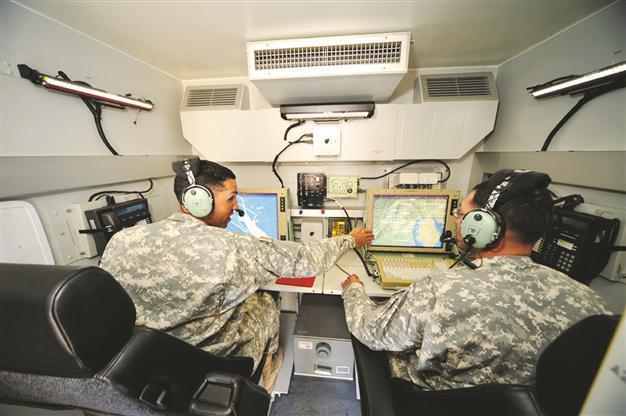US mulling more ‘shields’
WASHINGTON /SEOUL

This image, taken from Missile Defense Agency of US Department of Defense website, shows an interior view of the fire control and communications system of the Terminal High Altitude Area Defense (THAAD) system. AFP photo
The
United States is seeking to build regional shields against ballistic missiles in both Asia and the Middle East, akin to the controversial defense system in Europe, a senior Pentagon official disclosed on March 26.
The effort may complicate U.S. ties with Russia and China, both of which fear such defenses could harm their security, even though the United States says they are designed only to protect against states like Iran and North Korea. The U.S. push for new anti-missile bulwarks includes two sets of trilateral dialogues - one with Japan and Australia and the other with Japan and South Korea, according to Madelyn Creedon, Assistant Secretary of Defense for Global Strategic Affairs.
Such shields could help counter perceived threats to their neighbors from Iran and North Korea and also help defend the United States from any future long-range missiles that the two countries might develop, Creedon told a conference co-hosted by the Pentagon’s Missile Defense Agency. The model would be the so-called “phased adaptive approach” for missile defense in Europe, Creedon said. This includes putting interceptor missiles in Poland and Romania, a radar in Turkey and the home-porting of missile defense-capable Aegis destroyers in Spain.
Obama: I’m not hiding the ballIn the Middle East, Creedon said Washington would work to promote “interoperability and information-sharing” among the members of the Gulf Cooperation Council - Saudi Arabia, Kuwait, Bahrain, Qatar, the United Arab Emirates and Oman - as they acquire greater missile-defense capabilities. Meanwhile, NATO Secretary General Anders Fogh Rasmussen said the alliance would announce the completion of the first stage of the missile defense shield at a May summit in Chicago, which would not be including Russian leader Vladimir Putin. U.S. President Barack Obama said yesterday he is not trying to “hide the ball” in negotiations with Russia over U.S. plans for a missile defense shield in Europe, trying to put to rest a controversy over comments to Russia’s leader that were picked up by an open microphone.
Obama’s conversation was picked up by a microphone without either leader apparently knowing. “This is my last election,” Obama was heard telling Medvedev, Russia’s outgoing president. “After my election, I have more flexibility.” A day later, with election-year political machinery in full gear, Obama sought to clarify. “I want to reduce our nuclear stockpiles. And one of the barriers to doing that is building trust and cooperation around missile defense issues,” he said. “And so this is not a matter of hiding the ball,” Obama said. Obama said he wants to spend the rest of this year working through technical issues with the Russians, and said it was not surprising that a deal couldn’t be completed quickly.
“I don’t think it’s any surprise that you can’t start that a few months before presidential and congressional elections in the United States, and at a time when they just completed elections in Russia, and they’re in the process of a presidential transition,” Obama told reporters.
Compiled from Reuters, AFP and AP stories by the Daily News staff.
America, USA, US,
